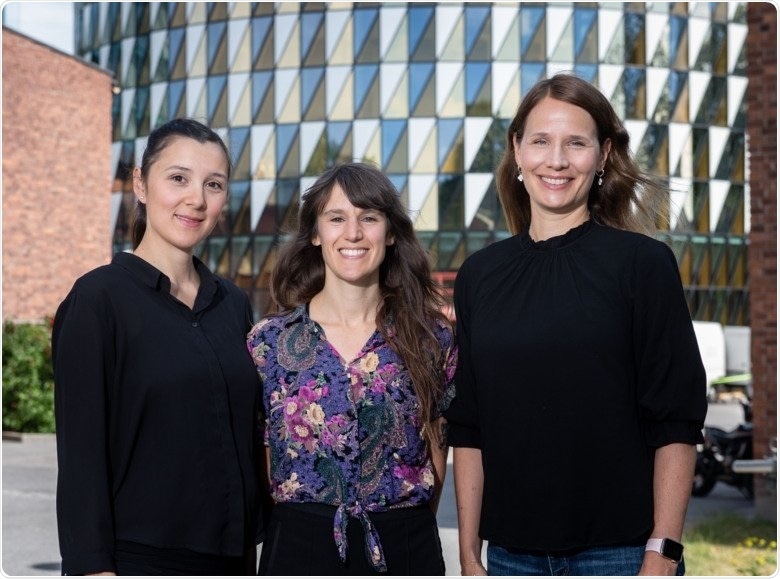Scientists from Karolinska Institutet collaborated with their British colleagues to perform the largest-ever study seeking genetic markers for cluster headache. In the long run, the study could open the door for more effective treatments.

Carmen Fourier, Caroline Ran, and Andrea Carmine Belin (from left to right). Image Credit: Stefan Zimmerman.
The research has been published in Annals of Neurology, a scientific journal.
Cluster headache causes highly intense, excruciating pain in one of the eyes. In general, patients describe that it seems like the eye is pushed out of the head. The headaches start and cease abruptly in the form of attacks that last from about 15 minutes to even 3 hours. These attacks tend to recur during the daytime at almost the same time.
Although the reason for cluster headache is not clear, heredity is a factor. At present, scientists from Karolinska Institutet have mapped this heredity by comparing blood samples of more than 600 people suffering from cluster headache with samples from 1100 control subjects.
The team carries out what is called a genome-wide association study (GWAS) where large parts of the genome were scanned to look for deviations between control subjects and patients. They found something new—two genetic regions were identified to have been linked to cluster headache.
International collaboration
The researchers then collaborated with a British research group, which collected blood and saliva samples from more than 850 people with cluster headache. A GWAS for this entire group of approximately 1,450 patients showed that two additional genetic regions are linked to cluster headache.
Then, the team compared the study results with those of research groups from the Netherlands and Norway, which identified the same four genetic regions. Combining data from all four research groups into a first preliminary meta-analysis helped identify a few more genetic regions relevant to cluster headache.
At present, the Swedish researchers have forged an international collaboration that invites other research groups investigating cluster headache participate—The International Consortium for Cluster Headache Genetics (CCG). The goal of the consortium is to collect clinical data and genetic samples from many more people who suffer from cluster headache.
We were surprised that we found such strong genetic connections with relatively limited material. This suggests that genetics plays an important role in this disease.”
Carmen Fourier, Postdoc, Department of Neuroscience, Karolinska Institutet
Many genes require further study in the areas of the genome identified as relevant to cluster headache. There are genes associated with pain signaling, neuroinflammation, and circadian rhythms. In addition, there are regions described earlier as relevant to migraines.
Although many different treatments are now used for cluster headache, none of them specifically target this form of headache. These are the purported triptans used in migraine, lithium, and some medicines used for blood pressure regulation.
However, these drugs do not help everyone. Scientists intend to further study and analyze whether the lack of efficacy is associated with the underlying genetics of these people.
The GWAS we have now developed is a good basis for moving forward in several ways. It is hoped that through a blood or saliva sample from the patient we could find out if triptans can have an effect and if not, offer other medicines. In the longer term, we hope to develop effective treatments that specifically target the genes that are relevant to cluster headache.”
Andrea Carmine Belin, Associate Professor and Research Group Leader, Department of Neuroscience, Karolinska Institutet
Source:
Journal reference:
O’Connor, E., et al. (2021) Genome-Wide Association Study Identifies Risk Loci for Cluster Headache. Annals of Neurology. doi.org/10.1002/ana.26150.